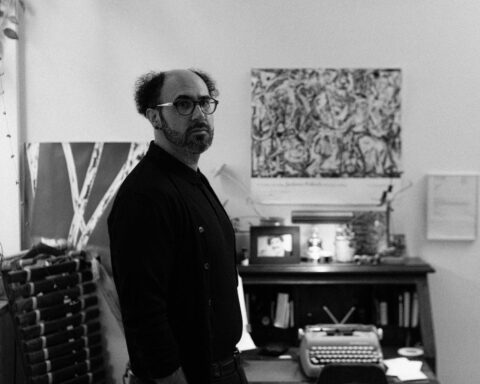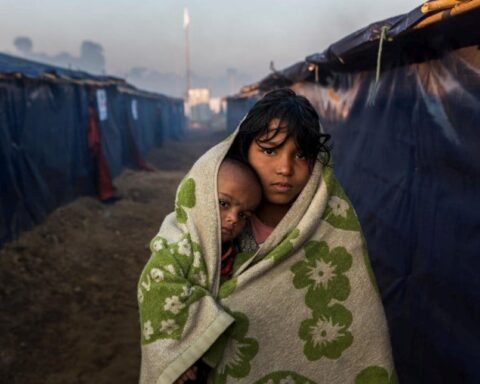Iraqi cellist Karim Wasfi’s video of his musical improvisations at the site of last month’s bombing in Baghdad became an online sensation – with over 47,000 collective hits on YouTube and various content sharing platforms.
I admit to being as moved as the thousands of others who watched worldwide as he played his cello on a blasted sidewalk in Mansour – the neighbourhood named after the Abbasid Caliph who championed arts and culture. And Wasfi continues to play at the site of bombings all over his city, performing this week in beleaguered Karrada, where several blasts have rocked the neighbourhood in recent weeks, and today in Adhamiya, at the site of a violent sectarian attack.
Video Source: YouTube/News House
But Wasfi’s story is not new to me.
In fact, I first met Karim in 2000, when Baghdad was enduring a different kind of siege: not car bombs, militias and ISIS at its gates, but rather a crippling embargo exacerbated by a dying police state and the growing strength of a criminal smuggling culture.
Inspired by his penchant for playing the cello under bombardment, I ended up dedicating two chapters to Karim – one bearing his name – in my 2005 book Dancing in the No Fly Zone that documented Iraqi culture pre and post invasion.
I remember [Karim] practising every day in the tiny flat, almost as a form of resistance against the whole situation.
When my US dollars ran out, I stayed with him and his sisters in their apartment across from the old Press Centre, seemingly under the radar of the ubiquitous “minders” (‘guides’ assigned by the old Ministry of Information who were in reality spying on journalists). I remember him practising every day in the tiny flat, almost as a form of resistance against the whole situation.
We even staged a fundraising concert for a children’s charity in the garden of an art gallery that was later bombed, performing Gounoud’s “Ave Maria” and some Leonard Cohen songs as rather desperate incantations.
Channeling a Musical Heartbeat
Indeed after my first trip to Iraq in 1997, to report on the state of sanctions-era health care for the NY Times, I discovered that Iraqi culture was far more seductive than interviewing beleaguered doctors and overwhelmed UN workers and compiling depressing statistics.
I remember spending three days in a private hospital run by a tough Iraqi nun – Sister Marie, who had to barter for black market penicillin –hearing the stories of patients who came here from all over Iraq, as the once shining example of public health care in the region that bore the ravages of sanctions.
A doctor, who had studied in California in the 1960s, offered me his practice as a “day in the life of” venue. Just when I could not bear to hear another story of a cancer patient with no access to proper pharmaceuticals, or a child stunted by malnutrition, a lady in her 80s wandered in.
There in the hospital full of dying children, [the once famous Iraqi singer] offered a gorgeous, throaty love song about moonlit nights and the scent of orange blossoms. I was transported.
She seemed arrested in another era; her dyed black bob and dark eye make up giving her the appearance of a ’30s Hollywood screen siren. As it turned out, she was a once famous Iraqi singer, who had been the mistress of Abdul Karim Qassim (who was deposed by a CIA backed Baathist coup when he got too cozy with the Russians and nationalized foreign oil interests).
She lived in a once swanky area, but like so many others drinking tainted water, and with chlorine blocked at the border, she was suffering from dysentery. Before long she and the doctor were chatting like old friends, an introduction was made and soon she began to sing.
There in the hospital full of dying children, she offered a gorgeous, throaty love song about moonlit nights and the scent of orange blossoms. I was transported.
In a similar moment, I had wandered accidentally into the al-Rashid theatre, strung out after a frustrating day talking to people who would lapse into Baathist platitudes as soon as they saw my “minder”, drawn in by the soothing sound of strings.
Indeed his music was very resonant with the current situation and expressed all the hopes of his generation, touching the soul of his city. But these were pre-internet days . . . Lance’s story never went “viral.”
I happened upon the rehearsal of a new orchestral piece called “Heartbeat of Baghdad” by a young composer named Lance Conway (whose improbable name came from his Anglo/Indian/Irish grandfather, part of the British occupation) that celebrated, he told me, “Baghdad’s history of resistance – from the Mongols to today.”
Indeed his music was very resonant with the current situation and expressed all the hopes of his generation, touching the soul of his city. But these were pre-internet days, and apart from a story in U.K. newspaper, The Independent, that I wrote about the orchestra, and a few paragraphs in my book, Lance’s story never went “viral.”
Making a Difference
Now Lance, a Christian, lives in Erbil, having fled the post invasion violence of the capital. Like so many of my friends in war zones, we reconnected recently via Facebook.
I mentioned the odd phenomenon of having former minders “friend me” at a recent evening at London’s Frontline Club – attended, as it turned out by Tony Borden, of the Institute for War and Peace Reporting, whose colleague Ammar Al Shabandar – a supporter of Wasfi’s efforts – had been killed two days earlier by a car bomb in Karrada.
In London, a city with thousands of Iraqi refugees and exiled artists – who keep their culture alive at venues like the Iraqi Cultural Centre on Shepherd’s Bush, which currently features an exhibition of paintings inspired by the ISIS Camp Speicher massacre – Janine di Giovanni read a poignant piece she’d written on Iraq for the latest Granta publication.
With Karim’s moving video having gone viral, and so much technology at our fingertips, I asked, would this ‘make a difference’ as they say, to the situation?
Sadly not, she replied, noting a distinct sense of ‘compassion fatigue’ in the West.
While the “cellist of Baghdad” has been playing in the rubble for the better part of two decades, and the misery in Iraq appears endless, it’s still enduring culture that offers medicine for the broken hearted and succour for the soul.
And yet acts of cultural defiance, I would argue – implicit in the title of my first book Dancing in the No Fly Zone, which was inspired by a lively chobi I encountered at a wedding in Baghdad the day after Clinton’s Desert Fox bombing campaign – are as important now as ever.
While the “cellist of Baghdad” has been playing in the rubble for the better part of two decades, and the misery in Iraq appears endless, it’s still its enduring culture that offers medicine for the broken hearted and succour for the soul.
I hope that Karim’s video will indeed make a difference. But predictably, as he posted on Facebook the other day, he is now under threat from a militia opposed to his performances.
I watch his Mansour video again now, as he plays next to a barefoot man in a wheel chair, and light a candle for Iraq. Inshallah el salam, I pray, and may music continue to heal the country’s many wounds.
Hadani Ditmars is the author of Dancing in the No Fly Zone and is working on a new book about ancient sites in Iraq. She has been reporting from the Middle East for two decades and is also a singer and musician. She will be performing some Andalucian songs at the Iraqi Cultural Centre in London at 6:30 p.m. on May 16, in solidarity with Iraqi people and artists.





